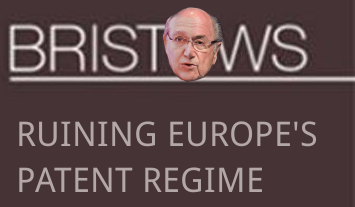

"If it was pro-UPC or had a favourable -- even if purely fictional -- view of the UPC, the patent microcosm would probably have prodded some publishers to write a bunch of puff pieces, complete with those infamous old lies which they keep repeating every week."Soon afterwards even some pro-UPC sites (of patent maximalists) took note of it. Managing IP, for instance, having previously set up pro-UPC events (with the EPO also involved), has just said: "UK in UPC after Brexit is “incompatible with EU principles” – Max Planck Institute [link] … An association of German research institutes concludes in a paper that the UK being in UPC post Brexit would create a “fictitious unity” that is incompatible with EU law..."
This links to a post we mentioned before the weekend. No other Web site appears to have covered it, at least not in English. If it was pro-UPC or had a favourable -- even if purely fictional -- view of the UPC, the patent microcosm would probably have prodded some publishers to write a bunch of puff pieces, complete with those infamous old lies which they keep repeating every week.
Funnily enough, last night we spotted the headline "Max Planck Institute publishes controversial opinion on continued UK involvement in the UPC" (it's not controversial at all).
We could immediately guess that it came from Bristows LLP or the likes of it. According to Bristows LLP, no such issue exists because Bristows LLP staff are a bunch of self-serving liars and they don't mind the world seeing that they're liars. Gregory Bacon wrote this piece; it was the first blog post in this blog for a very, very long time (awkward silence that actually says a lot!)...
"A very long paper with ample evidence is being contested by... basically nothing."The decision or determination from the said paper is not controversial; we saw not a single person publicly disputing it. Nobody. It's just not convenient to Team UPC, who decide to label it "controversial" and come up with their usual lies (which we covered here aplenty in the past).
Bacon has provided no evidence whatsoever that Matthias Lamping and Hanns Ullrich were wrong and therefore the title, calling it "controversial", isn't supported by any substance in the body. A very long paper with ample evidence is being contested by... basically nothing.
Here is the abstract of the paper, which is actually dated more than a fortnight back. We've highlighter some bits for 'lazy'(ier) readers:
Among the many problems Brexit raises in the field of European intellectual property those relating to the system of unitary patent protection stand out for their complex and controversial nature. The reason is that this system rests on two legally different but interconnected pillars: EU Reg. 1257/2012 on the implementation of enhanced cooperation by the creation of unitary patent protection on the one hand, and, on the other, the Agreement between the Member States of the EU on the establishment of a Unified Patent Court (UPC) that will have exclusive jurisdiction over invalidation and infringement actions concerning the European patent with unitary effect and/or the classic European (bundle) patent. However, the link between unitary protection of European patents and the UPC Agreement is not only one of jurisdiction, but also one of substantive law. Thus, as regards the rules on infringement of the unitary patent, Reg. 1257/2012 refers to those contained in the UPC Agreement in respect of the European (bundle) patent.
Many in the patent law community hope to overcome the disruptive effects the withdrawal of the UK from the EU will produce on both the territorial scope of unitary patent protection and on the UPC as a court common to EU Member States. However, unitary patent protection cannot be dissociated from the general legal order of the EU’s Internal Market and extended to the UK once it has left the Union. Any such extension is incompatible with the autonomous character of EU law and its institutions, will result in a legally split unity for separate and separately regulated markets, and conflict with both the UK’s and the EU’s public interests in defining and implementing a patent policy of their own. Since the core objective of the UPC Agreement is to establish for the adjudication of unitary patent protection a common court of EU Member States that, as such, forms part of the judicial system of the EU, continued participation in the UPC Agreement of the UK post Brexit will not be possible. It would be incompatible with the EU’s foundational principle, which is integration by virtue of the operation of an autonomous legal order based on a complete system of legal protection by national courts acting as ordinary courts of the Union and in cooperation with the Court of Justice of the EU.